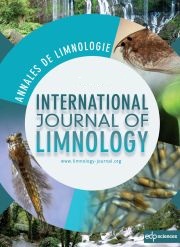Crossref Citations
This article has been cited by the following publications. This list is generated based on data provided by
Crossref.
Stamati, Fotini
Nikolaidis, Nikolaos
Dimitriou, Elias
and
Koussouris, Theodore
2008.
Hydro‐geochemical Aspects of Mediterranean Temporary Ponds in Western Crete.
Journal of Environmental Quality,
Vol. 37,
Issue. 1,
p.
164.
Vogiatzakis, I. N.
Kazakis, G.
and
Ghosn, D.
2009.
Macrophyte community structure and species occurrence in relation to environmental determinants in the ephemeral aquatic habitats of Gavdos, Greece.
Hydrobiologia,
Vol. 630,
Issue. 1,
p.
127.
Levin, Noam
Elron, Eldad
and
Gasith, Avital
2009.
Decline of wetland ecosystems in the coastal plain of Israel during the 20th century: Implications for wetland conservation and management.
Landscape and Urban Planning,
Vol. 92,
Issue. 3-4,
p.
220.
Velázquez, Javier
Tejera, Rosario
Hernando, Ana
and
Victoria Núñez, María
2010.
Environmental diagnosis: Integrating biodiversity conservation in management of Natura 2000 forest spaces.
Journal for Nature Conservation,
Vol. 18,
Issue. 4,
p.
309.
Zacharias, Ierotheos
and
Zamparas, Miltiadis
2010.
Mediterranean temporary ponds. A disappearing ecosystem.
Biodiversity and Conservation,
Vol. 19,
Issue. 14,
p.
3827.
Aponte, Cristina
Kazakis, George
Ghosn, Dany
and
Papanastasis, Vasilios P.
2010.
Characteristics of the soil seed bank in Mediterranean temporary ponds and its role in ecosystem dynamics.
Wetlands Ecology and Management,
Vol. 18,
Issue. 3,
p.
243.
Ghosn, Dany
Vogiatzakis, Ioannis N.
Kazakis, George
Dimitriou, Elias
Moussoulis, Elias
Maliaka, Valentini
and
Zacharias, Ierotheos
2010.
Ecological changes in the highest temporary pond of western Crete (Greece): past, present and future.
Hydrobiologia,
Vol. 648,
Issue. 1,
p.
3.
Gascón, Stéphanie
Machado, Margarida
Sala, Jordi
Cancela da Fonseca, Luís
Cristo, Margarida
and
Boix, Dani
2012.
Spatial characteristics and species niche attributes modulate the response by aquatic passive dispersers to habitat degradation.
Marine and Freshwater Research,
Vol. 63,
Issue. 3,
p.
232.
Rhazi, Laïla
Grillas, Patrick
Saber, Er-Riyahi
Rhazi, Mouhssine
Brendonck, Luc
and
Waterkeyn, Aline
2012.
Vegetation of Mediterranean temporary pools: a fading jewel?.
Hydrobiologia,
Vol. 689,
Issue. 1,
p.
23.
Ferreira, Mário
and
Beja, Pedro
2013.
Mediterranean amphibians and the loss of temporary ponds: Are there alternative breeding habitats?.
Biological Conservation,
Vol. 165,
Issue. ,
p.
179.
Foteinis, Spyros
Mpizoura, Katerina
Panagopoulos, Giorgos
Chatzisymeon, Efthalia
Kallithrakas-Kontos, Nikolaos
and
Manutsoglu, Emmanouil
2014.
A novel use of the caesium-137 technique to estimate human interference and historical water level in a Mediterranean Temporary Pond.
Journal of Environmental Radioactivity,
Vol. 127,
Issue. ,
p.
75.
Daoud-Bouattour, Amina
Bottollier-Curtet, Marion
Jamaa, Hafawa Ferchichi-Ben
Ghrabi-Gammar, Zeineb
Saad-Limam, Samia Ben
Rhazi, Laïla
and
Muller, Serge D.
2014.
Effects of hydrology on recruitment of Pilularia minuta Durieu (Marsileaceae), an endangered plant of Mediterranean temporary pools.
Aquatic Botany,
Vol. 112,
Issue. ,
p.
76.
Karaouzas, Ioannis
Dimitriou, Elias
Lampou, Anastasia
and
Colombari, Eva
2015.
Seasonal and spatial patterns of macroinvertebrate assemblages and environmental conditions in Mediterranean temporary ponds in Greece.
Limnology,
Vol. 16,
Issue. 1,
p.
41.
Boix, Dani
Kneitel, Jamie
Robson, Belinda J.
Duchet, Claire
Zúñiga, Luís
Day, Jennifer
Gascón, Stéphanie
Sala, Jordi
Quintana, Xavier D.
and
Blaustein, Leon
2016.
Invertebrates in Freshwater Wetlands.
p.
141.
Lumbreras, A.
Marques, J. T.
Belo, A. F.
Cristo, M.
Fernandes, M.
Galioto, D.
Machado, M.
Mira, A.
Sá-Sousa, P.
Silva, R.
Sousa, L. G.
and
Pinto-Cruz, C.
2016.
Assessing the conservation status of Mediterranean temporary ponds using biodiversity: a new tool for practitioners.
Hydrobiologia,
Vol. 782,
Issue. 1,
p.
187.
Styllas, Michael
Dimitriou, Elias
Gritzalis, Kostas
Koutsodimou, Maria
Karaouzas, Ioannis
Skoulikidis, Nikolaos
and
Gogou, Alexandra
2018.
Mid-Holocene changes in the geochemical and biotic conditions of an aquatic ecosystem, in Eastern Mediterranean.
Annales de Limnologie - International Journal of Limnology,
Vol. 54,
Issue. ,
p.
21.
Vasilatos, Charalampos
Anastasatou, Marianthi
Alexopoulos, John
Vassilakis, Emmanuel
Dilalos, Spyridon
Antonopoulou, Sofia
Petrakis, Stelios
Delipetrou, Pinelopi
Georghiou, Kyriacos
and
Stamatakis, Michael
2019.
Assessment of the Geo-Environmental Status of European Union Priority Habitat Type “Mediterranean Temporary Ponds” in Mt. Oiti, Greece.
Water,
Vol. 11,
Issue. 8,
p.
1627.
Hedges, Brock A.
Austin, Andy D.
Conran, John G.
Taylor, Gary S.
Madden, Chris P.
and
Weinstein, Philip
2021.
A likely association of damselflies with the habitat heterogeneity provided by the freshwater swamp lily,Ottelia ovalifolia, in Eyre Peninsula granite rock-holes, with a review of potential threats to this ephemeral habitat.
Transactions of the Royal Society of South Australia,
Vol. 145,
Issue. 2,
p.
152.
Campanale, Claudia
Galafassi, Silvia
Savino, Ilaria
Massarelli, Carmine
Ancona, Valeria
Volta, Pietro
and
Uricchio, Vito Felice
2022.
Microplastics pollution in the terrestrial environments: Poorly known diffuse sources and implications for plants.
Science of The Total Environment,
Vol. 805,
Issue. ,
p.
150431.
E. Mpeza, Paraskevi
2022.
Protected Area Management - Recent Advances.




